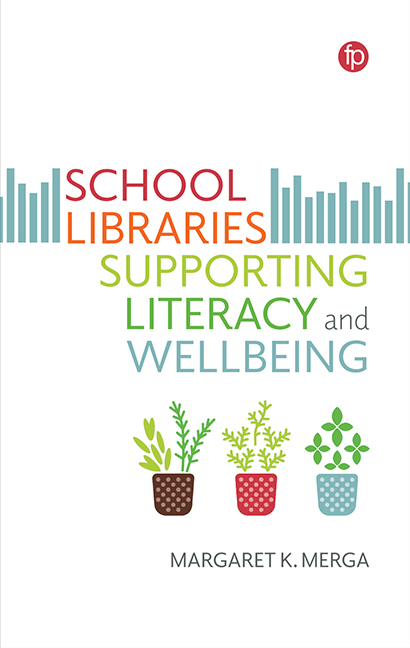Book contents
- Frontmatter
- Contents
- List of Tables
- Acknowledgements
- Abbreviations
- Introduction
- 1 What Do School Library Professionals Contribute to Student Learning and Support? A Focus on Australia and the UK
- 2 School Libraries and Reading Engagement for Literacy
- 3 Librarians Supporting Struggling Literacy Learners Beyond the Early Years
- 4 School Libraries and Reading Engagement for Student Wellbeing
- 5 School Libraries, Health Resourcing and Information Literacy
- 6 Librarians Creating Environments for Reading and Wellbeing
- 7 Challenges to Visibility and Advocacy for School Libraries and Staff
- Conclusions and Directions for Future Research
- Appendix 1 Background and Methods of My Research Projects
- Appendix 2 A Place to Get Away from It All: Five Ways School Libraries Support Student Wellbeing
- Index
1 - What Do School Library Professionals Contribute to Student Learning and Support? A Focus on Australia and the UK
Published online by Cambridge University Press: 21 April 2022
- Frontmatter
- Contents
- List of Tables
- Acknowledgements
- Abbreviations
- Introduction
- 1 What Do School Library Professionals Contribute to Student Learning and Support? A Focus on Australia and the UK
- 2 School Libraries and Reading Engagement for Literacy
- 3 Librarians Supporting Struggling Literacy Learners Beyond the Early Years
- 4 School Libraries and Reading Engagement for Student Wellbeing
- 5 School Libraries, Health Resourcing and Information Literacy
- 6 Librarians Creating Environments for Reading and Wellbeing
- 7 Challenges to Visibility and Advocacy for School Libraries and Staff
- Conclusions and Directions for Future Research
- Appendix 1 Background and Methods of My Research Projects
- Appendix 2 A Place to Get Away from It All: Five Ways School Libraries Support Student Wellbeing
- Index
Summary
What do school library professionals contribute to student learning and support? It will come as no surprise to you that the answer is a lot!
This is the longest chapter in the book, simply because school library professionals make a substantial and multifaceted contribution to student learning and support, but we need to start here and be expansive. The book is interested in the role of school libraries and their professional staff in supporting literacy and wellbeing, so it is important that these specific aspects of the role of school library professionals are considered within this broader frame of their role. Furthermore, school libraries and their staff are expected to contribute to student learning in contemporary schools, though the relationship between libraries and student achievement may not be well understood, so this chapter can also be used by school library professionals seeking to articulate some of the diverse facets of their role, as I will explore further in this chapter.
Associations between school libraries and student achievement have been extensively explored over time (Farmer, 2006; Lance & Kachel, 2018; Merga, 2019). While we can always do with more and higher quality research from diverse contexts (Stefl-Mabry et al., 2019), the evidence we have suggests that school libraries and their professional staff can make an important difference in the lives of young students. Although studies have often focused on the impact of libraries and library access on student performance in literacy testing (Francis et al., 2010; Hughes et al., 2014), this is only part of the whole picture around what libraries have to offer. This chapter takes a close look at the specific roles of teacher librarians in Australia and school librarians in the UK, exploring what they specifically do to enhance student learning, relating these practices to the research we already have around best practice and student learning.
Teacher librarian and school librarian: What is the difference?
First, I need to be clear that I do not conflate the roles teacher librarian and school librarian, even though I use the term school library professional commonly in this book to refer to both.
- Type
- Chapter
- Information
- School Libraries Supporting Literacy and Wellbeing , pp. 1 - 32Publisher: FacetPrint publication year: 2022



